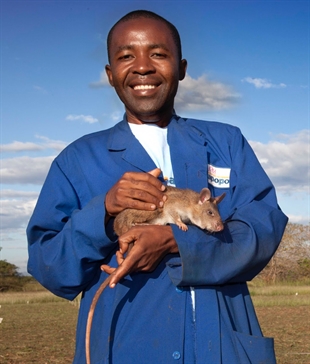
(DON THOMPSON / iNFOnews.ca)
February 05, 2018 - 12:00 PM
OPINION
I got an email last week that said Marcous - our rat who lived and worked in Cambodia - had retired. I must admit mixed emotions. He had been a hard working rat…by rat standards...and deserved a shot at the good life. But there was a part of me that was a tiny bit jealous…Marcous is retired…and I’m not.
If you’re confused…bear with me. You see, Marcous is a HeroRAT…the title given to a special breed of rats whose skills and talents range from detecting land mines in war-torn nations to diagnosing Tuberculosis in humans.
Obviously these are not ordinary rats. Until last month, Marcous was one of about 100 Gambian pouched rats - members of the Muroidea super-family that includes hamsters, mice and voles and nearly 1,400 other rodent cousins - to earn the title HeroRAT.
I became a rat fan a little more than a year ago. I wrote a story about them…and was so impressed with their unique abilities that my wife, Bonnie, and I adopted our first rat a week later. We sponsored Nisay, a female land mine detecting rat for $7 a month. Nisay was born and trained to sniff out land mines in Tanzania but was shipped to Siem Reap, Cambodia. Cambodia probably has more unexploded old land mines than any other nation.
She was a great rat…working the normal five-day-a-week rat race for about six months. Sadly, we received notice that she had died unexpectedly. No, not from some accident…simply from natural causes. That’s when we adopted Marcous…to complete Nisay’s unfinished work.
Before going further, a little background on Gambian pouched rats. The pouches refer to their cheeks, great for packing away their favourite fruits and nuts, though they are omnivorous creatures. The rats weigh no more than about three pounds…and their eyesight is so bad that members of the opposite sex always look good. What they lack in visual acuity…they more than make up for in a highly sensitive sense of smell. They have better noses than Bloodhounds.
Typically, land mines require about 11 pounds of pressure to detonate…trouble for humans…and even for trained bomb-detecting dogs. But these HeroRATS have been on the job for more than two decades…and not a single rat has died clearing land mines in areas ravaged by wars from Mozambique to Cambodia. Specifically, HeroRATS and their human handlers have cleared more than 110,000 land mines…returning more than 5,000 acres of land to farms and homes.

HeroRAT and handler in Tanzania
Image Credit: SUBMITTED/APOPO
Unexploded land mines are a huge problem in 64 countries worldwide. More than 6,000 - mostly women and children - were killed and maimed last year, according to the International Campaign to Ban Landmines. The group also reported that last year was the fourth straight year that funding for land mine removal from governments dropped...this time by 25 percent. So, private donations and adoptions are critically important.
HeroRATS were the brainchild of Bart Weetjens, a Belgian student who kept rats for pets as a boy growing up in Antwerp. He knew they had highly developed olfactory skills, and as a humanitarian, he thought they could be trained to detect land mines.
He founded a not-for-profit in Belgium called APOPO in 1997. It is an acronym that in English translates as Anti-Personnel Landmines Detection Product Development. The trainers rely on operant conditioning, using a combination of click training and food rewarding.
APOPO moved its headquarters from Antwerp to Morogoro, Tanzania in 2000, largely because of its affiliation with Sokoine University of Agriculture and the Tanzanian People's Defence Force. The group trains the rats, and conducts rat-related research and development programs.
The training starts at weaning and takes about nine months. Most rats detect mines for about five years before retiring like Marcous…with not a worry for the remainder of their lives. Most rats live to be eight or nine years old. Like most rats, these rodents are nocturnal, which means they are docile and easy to manage during their workday.
And that workday consists of manoeuvring throughout a mined area wearing a wired harness that allows them freedom of movement. Their sensitive little noses a couple inches from the ground and constantly twitching, the rats are trained to find trinitrotoluene (TNT), the chemical explosive component of virtually all land mines.
Their handlers mark with small flags the mines the rats detect, and a human crew comes by at day's end with a small charge that detonates the mines from a safe distance. The rats work five days a week...weekends off.
The rats are well cared for...with regular veterinarian visits and comfortable free-ranging cages for homes. Also, the rats are accustomed to human handling early on - usually six weeks old - and don't mind human touch. In fact, in hot climates the handlers often slather sun block on their little co-workers to ensure they aren't sunburned.
If the rat story ended here...it would still amount to a rat PR coup, and start to make up for that whole "Black Death" thing in the 14th century. But, the story doesn't end here. The research and development folks at APOPO in Tanzania started training the rats to sniff out Tuberculosis.
Tuberculosis (TB) is one of the world's most infectious disease killers affecting nine million people each year, with another estimated 3 million going undiagnosed, and more than 1.5 million deaths. Slow, inaccurate detection is a problem to be sure, with over-worked and under-funded government labs throughout Africa often miss-diagnosing or simply missing patient samples.
APOPO collects TB sputum samples from clinics, places them in rows of ten in the rat testing cages, and the rats start sniffing. Rats without fail sniff each sample in the row, and when the come to a positive sample, they sniff longer...a full four seconds.
They are more accurate by far than conventional lab testing...some 44 percent better than previous testing in Maputo, the capital and largest city in Mozambique. Plus, what takes a human two days to detect, a rat can finish in just 20 minutes. The reward for the rat...a great meal of banana and nut pulp. The reward for mankind...thousands of human lives saved each year.
Oh, Bonnie and I have a new rat…Magawa. We understand he is trying to fill the shoes - figuratively - of Marcous…who I envision sitting poolside beneath an umbrella popping banana chips with whatever might be a favourite rat beverage.
You can adopt or even gift a rat at www.apopo.org...perfect for that special someone on Valentine's Day?
We welcome your comments and opinions on our stories but play nice. We won't censor or delete comments unless they contain off-topic statements or links, unnecessary vulgarity, false facts, spam or obviously fake profiles. If you have any concerns about what you see in comments, email the editor.
News from © iNFOnews, 2018